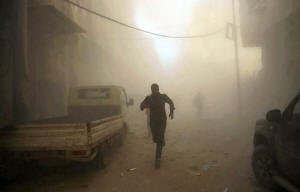|
Groundhog day in Geneva: old questions
haunt Syria talks
 Send a link to a friend
Send a link to a friend
 [February 22, 2017]
By Tom Miles and John Irish [February 22, 2017]
By Tom Miles and John Irish
GENEVA (Reuters) - When Syria peace talks
restart in Geneva on Thursday after 10 months in the deep-freeze,
familiar disagreements are likely to resurface, despite massive changes
in the military and political context.
President Bashar al-Assad's military advances, with Russian and Iranian
help, have transformed the battlefield since the last U.N. talks broke
up without progress in April 2016.
The political context is similarly unrecognizable, with new leadership
in Washington and the United Nations and tentative coordination between
Turkey, Russia and Iran.
But while a ceasefire exists, at least nominally, across most of Syria,
there has been little movement on the issues that dogged previous rounds
of talks.
The conflict that began with street protests six years ago has evolved
into a complex multi-sided war that has killed hundreds of thousands of
people and created the world's worst refugee crisis.
The opposition will press for prisoner releases, the lifting of
government sieges, and above all for a political transition leading to
the end of Assad's rule.
The government side is expected to stick with its view that the entire
armed opposition are terrorists. And with Assad militarily stronger than
he has been for years, it has the option of pressing home its advantage
on the ground if it doesn't get its way at the negotiating table.
"The opposition should understand that there are new realities on the
ground in Syria and international changes Ė itís not like it was in
2011," said pro-Assad Syrian parliamentarian Sharif Shehadeh.

"The circumstances, the (battlefield) has changed, the political
situation has changed, so they need to go with a mindset of
participation, not exclusion.Ē
Anas al-Abdah, head of the opposition Syrian National Coalition, said:
"We are fully committed to the Geneva talks and prepared to discuss a
political solution and transition. We cannot address the profound
security threats... while Assad remains in power."
U.N. mediator Staffan de Mistura summed up his mood as "determined" as
he prepared for Syrian delegates to arrive on Wednesday. He wants to
focus on reforming the governance of Syria, introducing a new
constitution, and holding elections under U.N. supervision.
"MAGNET FOR TERRORISM"
Some opposition figures, western and Arab diplomats fear that if Assad
stays in power, the violence will simmer for ever. A leak of a
Russian-drafted constitution suggests he could continue for several
seven-year terms.
"He will be a magnet for terrorism," one Western diplomat said. "Itís
obvious and logical but itís so difficult to sell as an idea, because
people are so desperate for peace. People are saying: 'Why do you
support terrorism? The priority is to stop terrorism, so go with
Bashar.'"
The opposition says Assad is responsible for hundreds of thousands of
deaths. His government blames the rebels for the bloodshed.
[to top of second column] |

Men run at a site hit by airstrikes in the rebel held besieged Douma
neighbourhood of Damascus, Syria February 19, 2017. REUTERS/Bassam
Khabieh/File Photo

Western diplomats said De Mistura was hopeful of bringing the
opposing Syrian factions face to face - unlike last year, when he
was forced to shuttle between them in "proximity talks" that proved
to be fruitless. But it was unclear whether this would be possible.
The government delegation will be led by Syria's U.N. ambassador
Bashar Ja'afari, while the main opposition delegation will be headed
by Nasr al-Hariri, a 40-year old cardiologist from the southern
province of Deraa, where the first major demonstrations against
Assad began in 2011.
Outside powers Russia and Iran, which back Assad, and Turkey and the
United States, which support his opponents, will have no direct role
in the talks.
A question mark hangs over the position of U.S. President Donald
Trump, whose public comments have signaled he is more concerned with
fighting Islamic State than with removing Assad. He appears to have
withdrawn from the U.S.-Russian co-leadership that drove Syria
diplomacy in the past.
"Where are the United States? I canít tell you, because I donít
know," de Mistura said last week. "One thing Iím missing at the
moment in order to have a clear equation... is a clear U.S.
strategy."
Stronger contacts between Russia, Turkey and Iran brought Syrian
negotiators to talks in Kazakhstan in January and this month, and
briefly stirred hope of fresh impetus. But those talks, which some
diplomats said might lead to a united front against designated
terrorist groups, ended in disarray.
New U.N. Secretary-General Antonio Guterres has played down
expectations of a breakthrough.
"Peace is only possible when none of the parties to the conflict
think they can win. Iím not sure we are yet there in Syria," he said
on Saturday.


"Iím afraid that some might still think, and I think itís a total
illusion, that they might win that war, so Iím not optimistic about
the short-term solution for the Syria crisis."
(Writing by Tom Miles, additional reporting by John Davison and
Kinda Makieh; Editing by Mark Trevelyan)
[© 2017 Thomson Reuters. All rights
reserved.]
Copyright 2017 Reuters. All rights reserved. This material may not be published,
broadcast, rewritten or redistributed. |